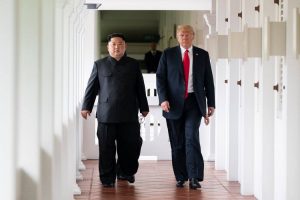The Trump-Kim summit in Singapore succeeded in averting, at least for the foreseeable future, what could have been worse than the Cuban Missile Crisis. It is now incumbent on the global community to work with Kim Jong Un to steer North Korea on a path of reform leading to the country’s emergence as a responsible member of the global community.
While the joint statement signed by Trump and Kim lacked specifics on denuclearization, specifics can be worked out in subsequent negotiations and real progress toward denuclearization can be achieved if the two sides form a good working relationship based on a degree of mutual trust. In this sense, the summit was a success in that the two leaders apparently found a common ground and formed personal rapport, which is essential for building mutual trust necessary to overcome decades of mutual animosity that had led to past agreements never being implemented.
Indeed, what was most significant about the summit was that Trump apparently felt that Kim was someone he could work with. This is in line with how Kim was received by President Moon Jae-in of South Korea and, apparently, also by President Xi Jinping of China. There are signs that Kim represents a new generation of leadership in North Korea that is a departure from previous generations. This new generation, also represented by Kim’s sister Kim Yo Jong and his wife Ri Sol Ju, seems marked by a pragmatism and an openness to try new approaches to make North Korea a “normal country.”
Since he came to power, Kim has allowed market forces to operate much more in North Korea’ economy and recently declared an all-out focus on economic development as the country’s priority. In his leadership style, Kim appears in public — and has traveled abroad — with his wife alongside him and has apparently impressed foreign leaders whom he has met as someone they could do business with. In Singapore, Kim went on a tour of the city’s top attractions where he even took a selfie with Singapore’s foreign minister. As reported in North Korea’s press, Kim undertook this tour not just for tourism but also to learn lessons for North Korea from Singapore’s success as an economy and a country.
Equally significant, the summit cannot but have major repercussions within North Korea. For decades, North Koreans have been brought up to regard the United States as their mortal enemy, and the perceived existential threat from the United States has shaped North Korea’s national identity as a country under siege in need of military strength and vigilance. With the results of the summit widely reported within North Korea, announcing a new era of peace with Washington, North Koreans will need to undergo a major reorientation in their national identity and how they relate to the outside world, especially the capitalist West represented by the United States. This new atmosphere of peace will likely bolster popular support for Pyongyang’s new program of all-out focus on economic development away from military spending. It may one day even lead to the demilitarized zone (DMZ) between the two Koreas becoming truly demilitarized.
With the Singapore summit, Kim Jong Un has effectively declared the end of North Korea’s era of diplomatic isolation. It is now incumbent on the global community to engage with Kim and steer him on a path toward denuclearization and further reforms to make his country a normal country. As Trump commented in a television interview after the summit, North Korea sits on great “real estate” between China and South Korea. Indeed, with the right reforms and support from the global community, North Korea has a great potential for economic development and will no longer need to earn cash via illicit means such as its diplomats trafficking in drugs and counterfeit currency.
It bears reminding that South Korea was among the poorest countries in the world in the 1960s when it embarked on a path of economic development. There is no reason why North Korea cannot be the next Asian “tiger economy” like South Korea, Taiwan, Singapore, or Vietnam. As North Korea reforms, it will likely become more open to accepting global norms regarding human rights, rule of law, and the like as it seeks foreign investment and full acceptance as a responsible member of the global community.
The global community needs to work with Pyongyang to hasten the day when railways through North Korea will connect South Korea with Berlin and North Korea will be known as a travel destination, not a land of political prison camps.
Jongsoo Lee is Senior Managing Director at Brock Securities LLC and Center Associate at Davis Center for Russian and Eurasian Studies, Harvard University. The opinions expressed in this essay are solely his own. He can be followed on Twitter at @jameslee004

































